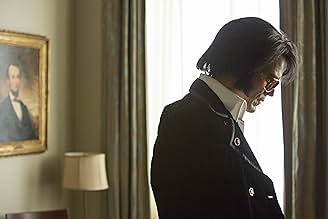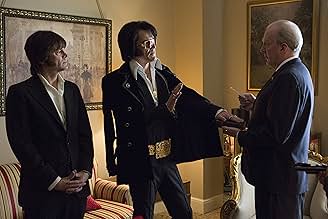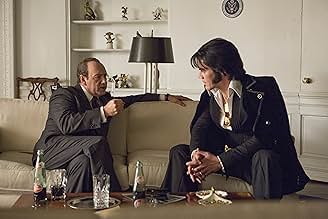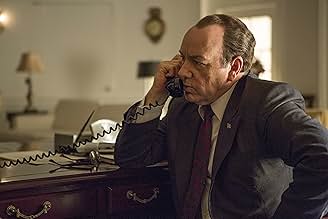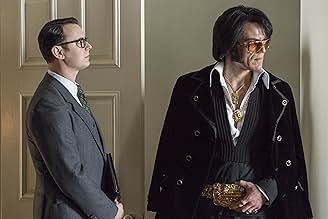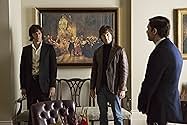PUNTUACIÓN EN IMDb
6,3/10
15 mil
TU PUNTUACIÓN
La historia no contada detrás del encuentro entre Elvis Presley, el Rey del Rock 'n Roll, y el presidente Richard Nixon, que dio como resultado este momento revelador, inmortalizado en la fo... Leer todoLa historia no contada detrás del encuentro entre Elvis Presley, el Rey del Rock 'n Roll, y el presidente Richard Nixon, que dio como resultado este momento revelador, inmortalizado en la fotografía más solicitada en los Archivos.La historia no contada detrás del encuentro entre Elvis Presley, el Rey del Rock 'n Roll, y el presidente Richard Nixon, que dio como resultado este momento revelador, inmortalizado en la fotografía más solicitada en los Archivos.
- Dirección
- Guión
- Reparto principal
- Premios
- 2 premios y 4 nominaciones en total
Skye Peters
- Stewardess #3
- (as Skye Forsyth-Peters)
Resumen
Reviewers say 'Elvis & Nixon' is a historical comedy-drama highlighting the unique meeting of Elvis Presley and President Richard Nixon. Praised for performances, especially Michael Shannon and Kevin Spacey, though some find Shannon's portrayal less convincing. The film blends humor with poignancy, though critics debate its depth and ambition. The supporting cast is well-received, making it an entertaining, albeit minor, biopic.
Reseñas destacadas
One is the king of rock and roll, one is the king of the United States. Whoever would have thought these two very different minds of two very different backgrounds would ever be seen in the same photo together? No transcript exists on these events, just a photograph that now has become the most requested photo from the US National Archives. Now here, in Elvis & Nixon, director Liza Johnson gives her interpretation of these events. It opens with the president receiving notification that the King has planned a visit, then this rather funny scene transitions immediately into a fun opening credits sequence full of 70's pop art against historical photographs of the two figures. From here, you learn some engaging facts that encourage further research, which sadly is supported by little excitement and little drama.
This historical documentation surveys an entirely separate side of Elvis from what the millennials may know about him. Did you know that he had a deputy's badge from Memphis? I sure didn't. It also turns out that he went to meet Nixon so that he could become a Federal Agent At Large in order to influence the American youth that tainted the country's image with the Hippie movement. Being America's most famous icon of the time, he decided to take advantage of his image by proposing possible anti-drug initiatives to the White House, including some drug-themed songs with other singers. The politicians all found it absurd to let someone like Elvis Presley meet the president of the United States, but since he's won the heart of all the voters in the south, the meeting gets the approval seal.
Revolutionary Road's Michael Shannon plays the King of Rock, and he talks as smooth, calm and collected as you'd think Elvis would be while not in front of a crowd. Unfortunately, he's not quite the right fit for the role, as he doesn't carry the project as well as he could. It's not that he's bad, he just doesn't put enough soul into the part.
It's otherwise intriguing to see what details are used to illustrate Mr. Presley. He still has all his little quirks that you expect from the King: he orders a maple bar from a donut shop, he calls the Beatles anti-American, and he says "thank you, thank you very much" right before sending people off with "sayonara." He watches three different television screens simultaneously and carries an assortment of diamond-studded pistols. There's more: he also had a twin brother who was born thirty-five minutes before him, only to die minutes later, and it makes him question how things would have gone if he was born first. It's stimulating and almost inspiring to see this unknown side to Elvis that actually cared about the American image and took the initiative for his beliefs.
However, this fascinating approach is supported by a rather clumsy first half. Elvis & Nixon was intended to generate laughter, but the laughs are far and few in-between, with dull scenes that either go nowhere or are composed of odd pauses between sentences. There are great additions such as fangirls working at the Bureau of Narcotics and Dangerous Drugs obsessing over Elvis's visit; the issue is that it's just too underplayed for what it had potential for. In fact, Elvis's interaction with Nixon should have started right from the get-go without an hour-long setup, because that is where the real funny begins. These moments express some beautifully uncomfortable humor between a celebrity and the president, made all the better by the naturally flowing chemistry between Michael Shannon and Kevin Spacey. I will admit, Spacey probably wasn't the right fit for the part: his mouth looks just like Nixon's but not his eyes. But that's more a bash on the casting director than the actor himself. Spacey still talks just as raspy as Mr. Nixon, and it's easy to tell that he took the character as seriously as if on House of Cards.
This is not the most spectacular piece of work you will ever see, you may not even remember it a week after seeing it, but it still gives a thought-provoking perspective on the influence that our celebrities have on our politics. Think of the artists of today. Consider how Taylor Swift's 1989 album influenced everyone's relationship expectations. Think back on the influence that John Lennon's Imagine shaped the hope everyone felt on the world. And don't get me started on all that Justin Bieber's went through. If you aren't dying to see Elvis & Nixon a second or even a first time, you can still bear in mind how our American icons influence far more than what we listen to in our spare time; the actions they take define what makes America the great nation we see it as.
Overall Grade: C+
This historical documentation surveys an entirely separate side of Elvis from what the millennials may know about him. Did you know that he had a deputy's badge from Memphis? I sure didn't. It also turns out that he went to meet Nixon so that he could become a Federal Agent At Large in order to influence the American youth that tainted the country's image with the Hippie movement. Being America's most famous icon of the time, he decided to take advantage of his image by proposing possible anti-drug initiatives to the White House, including some drug-themed songs with other singers. The politicians all found it absurd to let someone like Elvis Presley meet the president of the United States, but since he's won the heart of all the voters in the south, the meeting gets the approval seal.
Revolutionary Road's Michael Shannon plays the King of Rock, and he talks as smooth, calm and collected as you'd think Elvis would be while not in front of a crowd. Unfortunately, he's not quite the right fit for the role, as he doesn't carry the project as well as he could. It's not that he's bad, he just doesn't put enough soul into the part.
It's otherwise intriguing to see what details are used to illustrate Mr. Presley. He still has all his little quirks that you expect from the King: he orders a maple bar from a donut shop, he calls the Beatles anti-American, and he says "thank you, thank you very much" right before sending people off with "sayonara." He watches three different television screens simultaneously and carries an assortment of diamond-studded pistols. There's more: he also had a twin brother who was born thirty-five minutes before him, only to die minutes later, and it makes him question how things would have gone if he was born first. It's stimulating and almost inspiring to see this unknown side to Elvis that actually cared about the American image and took the initiative for his beliefs.
However, this fascinating approach is supported by a rather clumsy first half. Elvis & Nixon was intended to generate laughter, but the laughs are far and few in-between, with dull scenes that either go nowhere or are composed of odd pauses between sentences. There are great additions such as fangirls working at the Bureau of Narcotics and Dangerous Drugs obsessing over Elvis's visit; the issue is that it's just too underplayed for what it had potential for. In fact, Elvis's interaction with Nixon should have started right from the get-go without an hour-long setup, because that is where the real funny begins. These moments express some beautifully uncomfortable humor between a celebrity and the president, made all the better by the naturally flowing chemistry between Michael Shannon and Kevin Spacey. I will admit, Spacey probably wasn't the right fit for the part: his mouth looks just like Nixon's but not his eyes. But that's more a bash on the casting director than the actor himself. Spacey still talks just as raspy as Mr. Nixon, and it's easy to tell that he took the character as seriously as if on House of Cards.
This is not the most spectacular piece of work you will ever see, you may not even remember it a week after seeing it, but it still gives a thought-provoking perspective on the influence that our celebrities have on our politics. Think of the artists of today. Consider how Taylor Swift's 1989 album influenced everyone's relationship expectations. Think back on the influence that John Lennon's Imagine shaped the hope everyone felt on the world. And don't get me started on all that Justin Bieber's went through. If you aren't dying to see Elvis & Nixon a second or even a first time, you can still bear in mind how our American icons influence far more than what we listen to in our spare time; the actions they take define what makes America the great nation we see it as.
Overall Grade: C+
Michael Shannon as Elvis and Kevin Spacey (the king of impressions as Nixon? You sold me. Elvis & Nixon tells the untold 'true' story behind one of the most famous photos of all time between Elvis and Nixon at the Oval office. Shannon and Spacey deliver captivating performances as two icons in what is otherwise a very forgettable film.
At only an hour and twenty five minutes, Elvis & Nixon is a rather short film that is based on a true story, but it doesn't feel like it. It takes a while for the film to get going as it decidedly focuses primarily on Elvis for the first 45 minutes or so leading up to the meeting. You get glimpses of Spacey's Nixon here and there but we don't get the two on screen together until nearly an hour in. I would have much rather watched a full hour and a half of these two guys talking to each other. The story of Elvis' friend Jerry Schilling or anybody inside the White House, I didn't care about.
I understand you need to at least follow the true story to a point, but no one truly know the events that went down that day, so you might as well structure it to the strengths of your film. No matter, the time spent on screen with the two leads is a joy to watch. They are far from an SNL impression as they both create their own distinct interpretations of Elvis and Nixon. Even if it's an extremely slow burn, the last 30 minutes are definitely worth watching. If only a better movie surrounded the two great performances.
+Two lead performances
+Entertaining final 30 minutes
-Extremely slow burn
-Focus on side characters
6.6/10
At only an hour and twenty five minutes, Elvis & Nixon is a rather short film that is based on a true story, but it doesn't feel like it. It takes a while for the film to get going as it decidedly focuses primarily on Elvis for the first 45 minutes or so leading up to the meeting. You get glimpses of Spacey's Nixon here and there but we don't get the two on screen together until nearly an hour in. I would have much rather watched a full hour and a half of these two guys talking to each other. The story of Elvis' friend Jerry Schilling or anybody inside the White House, I didn't care about.
I understand you need to at least follow the true story to a point, but no one truly know the events that went down that day, so you might as well structure it to the strengths of your film. No matter, the time spent on screen with the two leads is a joy to watch. They are far from an SNL impression as they both create their own distinct interpretations of Elvis and Nixon. Even if it's an extremely slow burn, the last 30 minutes are definitely worth watching. If only a better movie surrounded the two great performances.
+Two lead performances
+Entertaining final 30 minutes
-Extremely slow burn
-Focus on side characters
6.6/10
I had heard the story of Elvis' meeting with Nixon, but not how it came about. How true this story is, is open to conjecture. The wonderful Kevin Spacey is totally acceptable as Nixon. The look, the voice and the stooped deportment, are spot on. Unfortunately, I never for on moment thought that I was looking at Elvis. Michael Shannon's wig was about the only thing that was on the money. Elvis was very handsome, with tremendous charisma, and a good build. Shannon had none of that going for him. Colin Hanks is improving every time I see him. His portrayal of a Nixon aide was nicely drawn. Johnny Knoxville was rather wasted, as part of the Elvis 'mafia'. It's not a bad bad film and is not padded out too much, though it would probably have made a better television show.
Elvis & Nixon very much relies on the performances of Kevin Spacey and Michael Shannon, and thrives on what they bring to the eventual meeting between Elvis Presley and Richard Nixon. The movie is based on a true story that's better documented than is suggested here. Making Elvis & Nixon fanciful and fabricated in spite of how unusual this event actually was. Which is fine, because most biopics and fact-based dramas exist on creative licence. Although this is a movie that could have been equally successful had more of the facts been more closely adhered to in the script.
What matters, however, is how interesting and appealing Spacey and Shannon make the film's central characters. Although we find a way into their respective worlds by way of Colin Hanks' "Bud Krogh" and Alex Pettyfer's "Jerry Schilling." Schilling in particular, whose fingerprints are evident throughout the movie ("me and a guy named Elvis" is a line of dialogue at one point," this being the title of Schilling's autobiography) and who acts almost like an audience surrogate.
Schilling, who we first encounter working at Paramount Studios, is encouraged back "in" with Elvis as we are taken on a journey to the White House that's foreshadowed in our first glimpse of the man, himself. Watching Dr. Strangelove on one of his three televisions in a nicely recreated Graceland television room. But this isn't just a reference to one of Elvis's favourite movies, the scene from Kubrick's film that's used here foreshadows the nature and tone of his meeting with Nixon. No fighting in the War Room? How about karate in the Oval Office?!
Along the way, Shannon, who doesn't resemble Elvis but embodies the role with gestures small and grand, speech patterns, glances and a physicality that's undoubtedly been studied, becomes believable as Elvis. This isn't a caricature. The caricature is what Elvis actually became. Which is appreciated in the way he expresses concerns about his identity to Schilling, and in a touching monologue about his stillborn brother, Jessie Garon.
Shannon finds genuine nuance and pathos in Elvis. Although Liza Johnson's direction doesn't quite allow the excitement and elation of meeting Nixon to be juxtaposed with crushing lows or an indication of how such ultimately manifested itself in Elvis over subsequent years. We see him disappointed when things aren't going his way and when meeting Nixon seems lost at one point, but standing slumped and resigned isn't enough to encourage deeper sympathy for Elvis. Whilst the ultimate irony was missed in failing to depict his own problems with drugs.
As Nixon, Spacey also finds nuance and manages to make the former President larger than life from behind a desk and despite his reservations about meeting Elvis, and just about everything else. He has less to work with than Shannon, but Spacey gets Nixon just right and manages to refrain from caricature whilst exploring amusing traits and mannerisms. Both physical and psychological.
Beyond the two central characters, the screenplay and some variable stock footage encourages political and cultural touch-points that aren't dwelled upon. Although it's clear that Nixon isn't adverse to finding good PR opportunities or impressing his daughters. A trend that crops up throughout the movie, with Elvis using such as a free pass at his convenience. For him, good PR opportunities are also valuable.
In many ways, however, Elvis and Nixon suffer the same issues with loneliness, isolation and concerns about their image. Which is something Elvis is portrayed as being more in touch with than Nixon, who laments about not looking like a Kennedy and tries to boost his ego by asking Krogh if he could take Elvis in a fight. Elvis, on the other hand, is aware of his image and the performance that's required just to be Elvis Presley. Which is something that was also expressed by Michelle Williams' Marilyn Monroe in Simon Curtis' 2011 film, My Week With Marilyn.
By the time Elvis and Nixon eventually meet, both characters have been fully established, and whilst the vignettes along the way are both funny and geared towards comedy, some miss the mark completely. Such as a clandestine meeting between Elvis and Nixon's aides, that hints towards All the Presidents Men but plays more like a parents' meeting. Although Elvis's visit to a doughnut shop that's populated by a streetwise and vocal black clientele shows him comfortable with all walks of life and able to keep his ego in check.
This is in stark contrast to his meeting with Nixon, where Elvis is far from humbled and tries to impress upon the President with bizarre notions and one-upmanship. In one shot, Elvis seems to dwarf Nixon in the way both men are framed. But Spacey plays the President with quick wit and more than a little bemusement at what's in front of him. He sees what see in Elvis. But can't see that he's playing him for his own gain.
Unfortunately, the pacing and editing falters during the final act, with Schilling's personal dilemma of getting home to his girlfriend breaking the meeting up at one point. Whilst Evan Peters and Johnny Knoxville's Dwight Chapin and Sonny West, respectively, linger in thankless roles.
What's also noticeable is a lack of Elvis's music in the film's soundtrack, which is quite good regardless. Although Ed Shearmur's score is transparent and obtrusive at times. But Elvis & Nixon isn't about Elvis and his music. It's about a quest to find something fulfilling in his life. Which is expressed with profound sincerity in the way Michael Shannon plays Elvis. Getting under his skin and contrasting charisma and personality with a pensive nature and moments of uncertainty. It's a warm, affectionate and earnest performance in a movie that's skewed towards comedy, but has an acute understating of not only Elvis and Nixon, but celebrity and politics.
What matters, however, is how interesting and appealing Spacey and Shannon make the film's central characters. Although we find a way into their respective worlds by way of Colin Hanks' "Bud Krogh" and Alex Pettyfer's "Jerry Schilling." Schilling in particular, whose fingerprints are evident throughout the movie ("me and a guy named Elvis" is a line of dialogue at one point," this being the title of Schilling's autobiography) and who acts almost like an audience surrogate.
Schilling, who we first encounter working at Paramount Studios, is encouraged back "in" with Elvis as we are taken on a journey to the White House that's foreshadowed in our first glimpse of the man, himself. Watching Dr. Strangelove on one of his three televisions in a nicely recreated Graceland television room. But this isn't just a reference to one of Elvis's favourite movies, the scene from Kubrick's film that's used here foreshadows the nature and tone of his meeting with Nixon. No fighting in the War Room? How about karate in the Oval Office?!
Along the way, Shannon, who doesn't resemble Elvis but embodies the role with gestures small and grand, speech patterns, glances and a physicality that's undoubtedly been studied, becomes believable as Elvis. This isn't a caricature. The caricature is what Elvis actually became. Which is appreciated in the way he expresses concerns about his identity to Schilling, and in a touching monologue about his stillborn brother, Jessie Garon.
Shannon finds genuine nuance and pathos in Elvis. Although Liza Johnson's direction doesn't quite allow the excitement and elation of meeting Nixon to be juxtaposed with crushing lows or an indication of how such ultimately manifested itself in Elvis over subsequent years. We see him disappointed when things aren't going his way and when meeting Nixon seems lost at one point, but standing slumped and resigned isn't enough to encourage deeper sympathy for Elvis. Whilst the ultimate irony was missed in failing to depict his own problems with drugs.
As Nixon, Spacey also finds nuance and manages to make the former President larger than life from behind a desk and despite his reservations about meeting Elvis, and just about everything else. He has less to work with than Shannon, but Spacey gets Nixon just right and manages to refrain from caricature whilst exploring amusing traits and mannerisms. Both physical and psychological.
Beyond the two central characters, the screenplay and some variable stock footage encourages political and cultural touch-points that aren't dwelled upon. Although it's clear that Nixon isn't adverse to finding good PR opportunities or impressing his daughters. A trend that crops up throughout the movie, with Elvis using such as a free pass at his convenience. For him, good PR opportunities are also valuable.
In many ways, however, Elvis and Nixon suffer the same issues with loneliness, isolation and concerns about their image. Which is something Elvis is portrayed as being more in touch with than Nixon, who laments about not looking like a Kennedy and tries to boost his ego by asking Krogh if he could take Elvis in a fight. Elvis, on the other hand, is aware of his image and the performance that's required just to be Elvis Presley. Which is something that was also expressed by Michelle Williams' Marilyn Monroe in Simon Curtis' 2011 film, My Week With Marilyn.
By the time Elvis and Nixon eventually meet, both characters have been fully established, and whilst the vignettes along the way are both funny and geared towards comedy, some miss the mark completely. Such as a clandestine meeting between Elvis and Nixon's aides, that hints towards All the Presidents Men but plays more like a parents' meeting. Although Elvis's visit to a doughnut shop that's populated by a streetwise and vocal black clientele shows him comfortable with all walks of life and able to keep his ego in check.
This is in stark contrast to his meeting with Nixon, where Elvis is far from humbled and tries to impress upon the President with bizarre notions and one-upmanship. In one shot, Elvis seems to dwarf Nixon in the way both men are framed. But Spacey plays the President with quick wit and more than a little bemusement at what's in front of him. He sees what see in Elvis. But can't see that he's playing him for his own gain.
Unfortunately, the pacing and editing falters during the final act, with Schilling's personal dilemma of getting home to his girlfriend breaking the meeting up at one point. Whilst Evan Peters and Johnny Knoxville's Dwight Chapin and Sonny West, respectively, linger in thankless roles.
What's also noticeable is a lack of Elvis's music in the film's soundtrack, which is quite good regardless. Although Ed Shearmur's score is transparent and obtrusive at times. But Elvis & Nixon isn't about Elvis and his music. It's about a quest to find something fulfilling in his life. Which is expressed with profound sincerity in the way Michael Shannon plays Elvis. Getting under his skin and contrasting charisma and personality with a pensive nature and moments of uncertainty. It's a warm, affectionate and earnest performance in a movie that's skewed towards comedy, but has an acute understating of not only Elvis and Nixon, but celebrity and politics.
Argumento
¿Sabías que...?
- CuriosidadesBased on a true story. In December 1970, Elvis Presley met President Richard Nixon, who appointed Presley as an honorary DEA agent.
- PifiasIn the Oval Office: The Dr Pepper bottles logos are ten years ahead of their time.
- ConexionesFeatured in Vecherniy Urgant: Olga Pogodina/Andrey Chernyshov (2016)
- Banda sonoraHold On I'm Coming
Written by Isaac Hayes & David Porter (as Dave Porter)
Performed by Sam & Dave
Courtesy of Atlantic Recording Corp.
By Arrangement with Warner Music Group Film & TV Licensing
Selecciones populares
Inicia sesión para calificar y añadir a tu lista para recibir recomendaciones personalizadas
- How long is Elvis & Nixon?Con tecnología de Alexa
Detalles
Taquilla
- Recaudación en Estados Unidos y Canadá
- 1.055.287 US$
- Fin de semana de estreno en EE. UU. y Canadá
- 466.447 US$
- 24 abr 2016
- Recaudación en todo el mundo
- 1.798.432 US$
- Duración1 hora 26 minutos
- Color
- Relación de aspecto
- 2.35 : 1
Contribuir a esta página
Sugerir un cambio o añadir el contenido que falta

Principal laguna de datos
By what name was Elvis & Nixon (2016) officially released in India in English?
Responde






